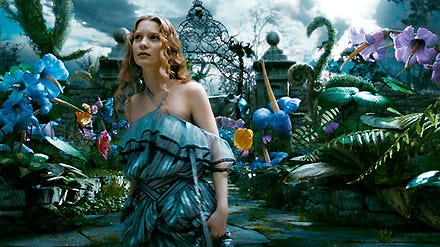The Burton Binge: "Alice in Wonderland"
Each Sunday with “The Burton Binge,” Sam Watermeier will look back at one of Tim Burton’s films, ultimately tracing the return to the auteur’s roots with the October 5 release of “Frankenweenie,” an animated adaptation of Burton’s first live-action short film.

“It’s always the same. Don’t most people have different dreams?”
This early line from “Alice in Wonderland” could easily be used against director Tim Burton — a man, like the main character, questioned for indulging in the same sort of whimsy.
“Alice in Wonderland” is his answer to critics — a defiant display wrapped in what appears to be a phone-in job. Although Lewis Carroll’s dark fantasy novel may seem like the primrose path of least resistance for Burton, it led him to make a surprisingly poignant commentary on his style and career.
Mia Wasikowska plays Alice, a Victorian ingénue on the verge of an arranged marriage. While tip-toeing around it, she tumbles down a rabbit hole into the titular world, where she imbibes all sorts of potions and ideas and goes through a multitude of physical changes. Sounds like typical adolescence, right?
While the film has the same funhouse feel as “Charlie and the Chocolate Factory,” it carries far more emotional heft — thanks in large part to Wasikowska’s soulful performance. Looking as though she is carrying the weight of the world and wanting to toss it at the same time, she delivers a piercingly accurate, sympathetic portrayal of a teenager.
Oddly enough, the film speaks more to Burton the director than Burton the tortured teenager.
The film probably wouldn’t feel as personal or hefty if he directed it earlier. Now, it seems like a long-suppressed summary and defense of his style and career. That is most evident in this bit of dialogue from Alice:
“From the moment I fell down that rabbit hole, I’ve been told where I must go and who I must be. I’ve been shrunk, stretched, scratched, and stuffed into a teapot. I’ve been accused of being Alice and of not being Alice, but this is my dream. I'll decide where it goes from here.”
Alice’s journey clearly mirrors the director’s. And recent criticisms of, and missteps from, Burton add weight to dialogue like this, confirming the notion that, without the dark, we’d never see the stars — the primary idea in which “Alice in Wonderland” is rooted.
Alice’s adventurous, defiant nature brings warmth to what could have been a cold computer-generated world. Although the crude, organic construction of Burton’s early visions is preferable, Wonderland is the most tangible of his digital worlds.
Its inhabitants are equally rich and magnetic. Johnny Depp infuses the Mad Hatter with a sense of melancholy wonder while Helena Bonham Carter evokes a tantrum-throwing child as the evil, big-headed Red Queen. And Anne Hathaway delivers a subtly satirical performance as her good sister the White Queen, gently parodying the elegant nature of such an archetype. All of them work together to create a darkly fun, quirky atmosphere.
“Alice in Wonderland” will undoubtedly be remembered as one of Burton’s lesser films. However, there is more to it than meets the eye. It’s all too easy to see it as a woefully obvious project for Burton, but that only makes its personal, heartfelt nature that much more surprising. It may not be one of Burton's very best films, but it's definitely one of his better efforts in the last decade.
Stay tuned as I will soon explore the second-to-last film in this binge, “Dark Shadows.”


